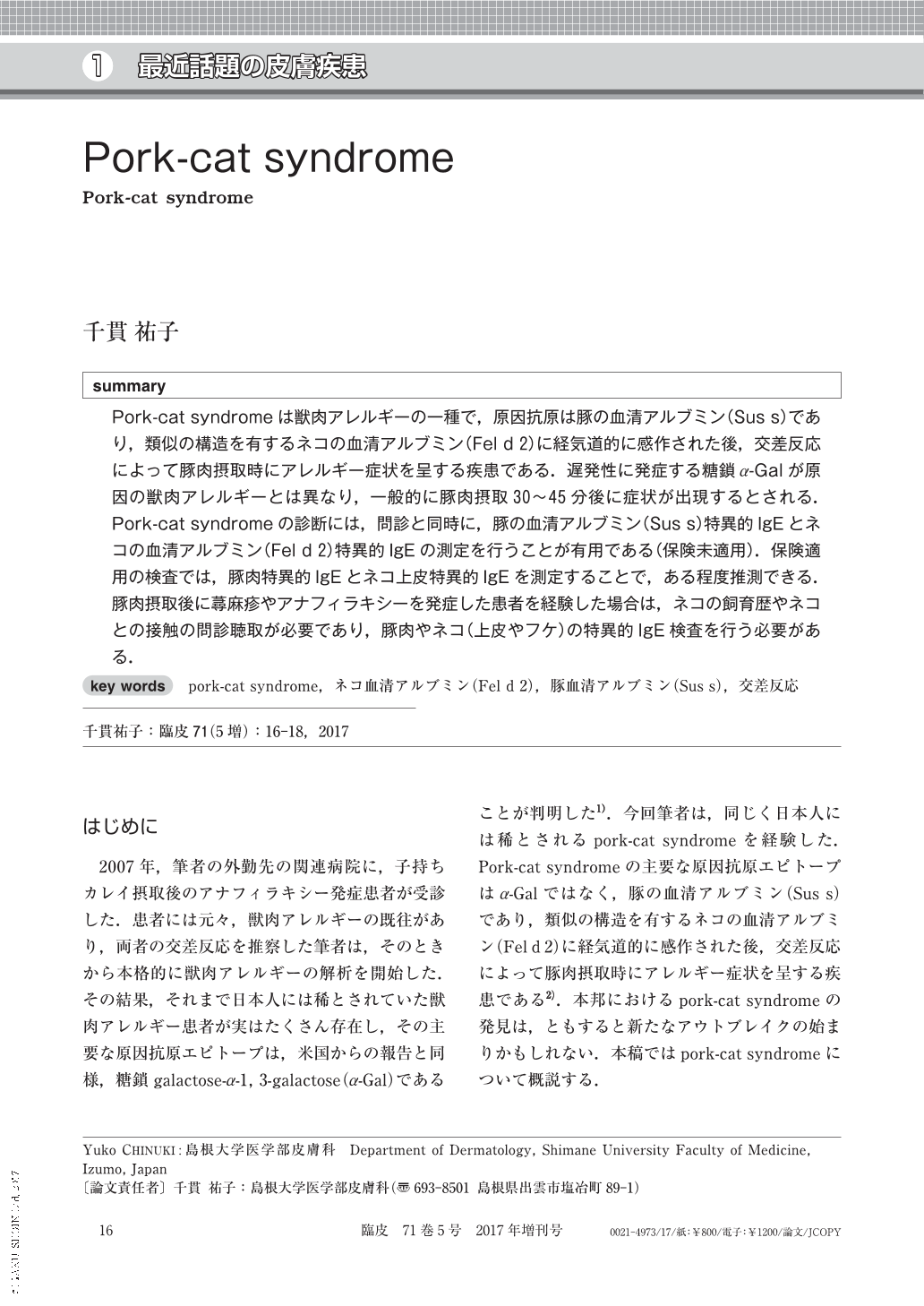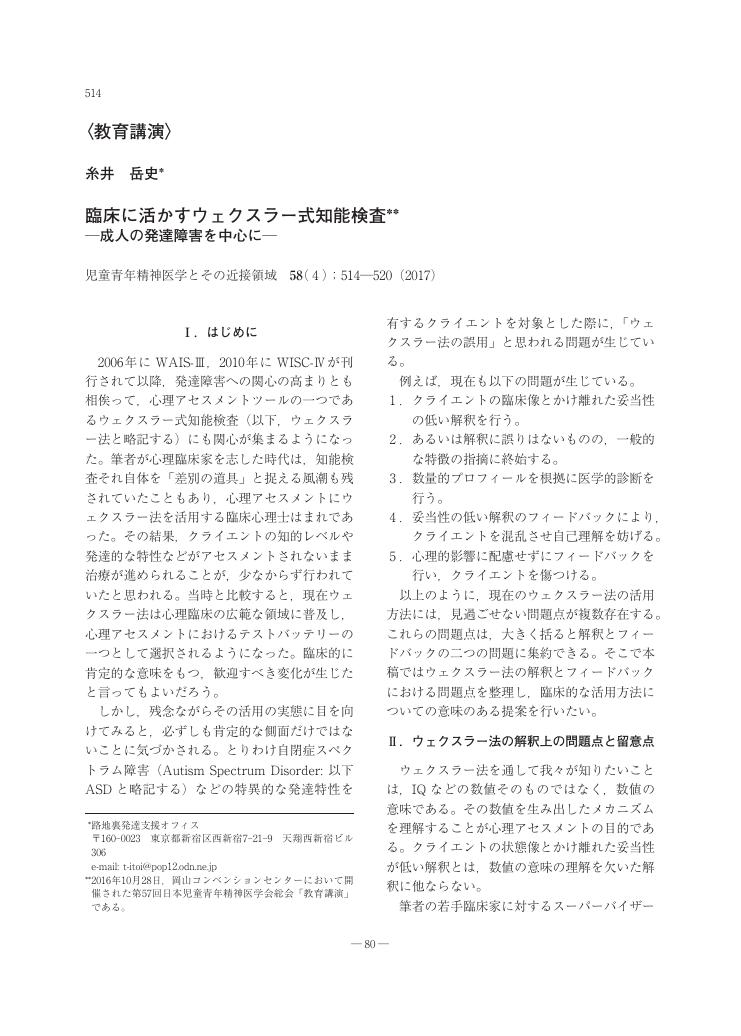272 0 0 0 OA 働く母親と有償労働の意味――非大卒女性の稼ぎ手役割と職業役割をめぐる意識――
- 著者
- 藤田 結子 額賀 美紗子
- 出版者
- 日本家族社会学会
- 雑誌
- 家族社会学研究 (ISSN:0916328X)
- 巻号頁・発行日
- vol.33, no.1, pp.7-20, 2021-04-30 (Released:2021-05-26)
- 参考文献数
- 29
本研究は,女性活躍推進の流れの中,未就学児を育てる非大卒女性の稼ぎ手役割・職業役割に注目し,研究の問いとして「育児期の非大卒女性はどのような生計維持分担意識を抱いているのか」「ジョブ/キャリアの観点から,どのように自分の職業を捉えているのか」を考察することを目的とする.調査方法にはインタビュー調査と参与観察を用いる.調査の結果,高卒女性には母親役割の延長として家計補助をする傾向がみられたが,専門学校卒女性の事例には同等の稼ぎ手であろうとする意識,またキャリアとして職業を捉える傾向が明らかになった.しかし先行研究の大卒女性と異なり,本研究の非大卒女性の場合,生計維持分担意識が高くキャリア志向でも,妻のキャリアや家事育児に対する夫のサポートが少ないことがわかった.階層とジェンダーの観点からは,育児期の男性・大卒女性と比べて,育児期の非大卒女性はキャリアへの従事,家庭責任の軽減が難しかった.
272 0 0 0 OA 授業「文法を考える」 : 「あいまいな文」と「文の不自然さ」の検討を中心に
- 著者
- 安部 朋世
- 出版者
- 筑波大学国語国文学会
- 雑誌
- 日本語と日本文学 (ISSN:02856352)
- 巻号頁・発行日
- no.33, pp.L39-L52, 2001-08-31
272 0 0 0 動詞活用の乱れは、音韻、意味の乱れと、悪い友達
平成29年度は、7月~12月の間、研究協力者であるマンチェスター大学のLambon-Ralph教授の研究室に滞在し、英語と日本語の動詞活用の研究を行っているケンブリッジ大学のPatterson博士も交え、議論を重ねた。日本語の動詞活用に関しては15年ほど前に故伏見貴夫博士、Patterson博士、および研究協力者の辰巳ほかがJ Mem Langに投稿し、修正途中で終った研究が唯一のものである。そこでまずその研究の刺激語と実験データを関係者に発掘してもらい、再分析することから始めた。15年前、動詞活用に関しては、規則動詞の処理を行う「文法」(grammar: look→looked)と例外動詞の活用形(give→gave)を保持する「レキシコン」の二重機構を仮定するPinkerらと、規則動詞、例外動詞が同じ機構により処理されるとするコネクショニストとの間で激しい論争が行われていた。伏見らの研究も日本語の動詞を規則/例外動詞(五段/一段動詞)に分けて活用成績を比較したが、成績差が安定せず、また規則活用されるはずの非語動詞の正答率が著しく低い場合(例、もさかぶ)があることが判明した。もし日本語の非語動詞が規則に基づき活用されるなら、英語の場合と同様に、実在動詞の正答率と同等になってよい。英語は屈折語だが動詞活用は非常に単純であるのに対し、日本語は膠着語で動詞活用は規則的だが種類が著しく多い。そこでこの15年間に発表された多数の論文を調べたところ、我々の再分析結果と同様に、フィンランド語(膠着語)の動詞活用や、セルビア語(屈折語)の複雑な名詞の屈折は、英語のように単純に規則/例外に区分け、比較することには無理があることが判明した。日本語の動詞活用には、意味の有無が大きな影響を与えるようであり、少なくとも意味の関与を考慮する必要がある。このため新たな枠組の中で実験を行うことになった。
271 0 0 0 OA 大卒若年総合職の昇進意欲 ― 性差の基礎的分析 ―
- 著者
- 太田 さつき 久保田 貴之 高城 佳那 漁田 武雄 日隈 美代子
- 雑誌
- 環境と経営 : 静岡産業大学論集 = Environment and management : journal of Shizuoka Sangyo University
- 巻号頁・発行日
- vol.26, no.1, pp.95-108, 2020-06-01
WEB調査会社モニタ会員の20歳代の大卒総合職を対象に調査を行い、昇進意欲および昇進意欲に関係すると思われる要因の男女差を調べた。目指す役職については、明確な男女差がみられ、女性は男性よりも上位の役職を希望していなかった。女性は男性より管理職に必要と思われる能力への自信が低く、自信に繋がる職務経験が少ない傾向にあった。組織の女性活躍推進や男女均等の施策を高く知覚するほど、自信に繋がる職務経験をするほど、男女ともに上位の役職を目指していた。女性においては、能力への自信と目指す役職との間に明確な正の関係がみられた。
271 0 0 0 OA シーフードによる職業性の接触蕁麻疹と口腔アレルギー症候群の1例
- 著者
- 山口 絢子 猪又 直子 広門 未知子 嶋倉 邦嘉 塩見 一雄 池澤 善郎
- 出版者
- 一般社団法人 日本アレルギー学会
- 雑誌
- アレルギー (ISSN:00214884)
- 巻号頁・発行日
- vol.56, no.1, pp.49-53, 2007-01-30 (Released:2017-02-10)
- 参考文献数
- 12
- 被引用文献数
- 3
20歳女性.乳児期よりアトピー性皮膚炎.幼少時より生魚を接触した際に〓痒を認めたが経口摂取は可能であった.2年前に回転寿司屋でアルバイトを開始してから,数滴の魚液に接触しただけで手の腫脹が出現した.1年前からはシタビラメやサンマ,アジ,サケ,ホッケ,ブリを加熱調理して摂取時に口唇〓痒や腫脹,アナゴ摂取時に喉頭閉塞感や嗄声,エビやカニを摂取時に口唇腫脹,アワビに似た貝を摂取時に喘鳴や嗄声,呼吸困難,全身性蕁麻疹が出現した.特異IgE抗体やプリックテストでは硬骨魚綱,甲殻鋼,軟体動物等多種で陽性.焼シタビラメによる口含み試験では口唇違和感が出現し,経口負荷試験では口唇腫脹や喉頭閉塞感,嚥下困難感,腹痛が出現した.パルブアルブミンとコラーゲンに対する血清特異IgE抗体は,ELISA法にて検出.以上よりシーフードによる職業性の接触蕁麻疹と口腔アレルギー症候群と診断した.
271 0 0 0 OA 佐渡鉱山と朝鮮人労働者(1939~1945)
- 著者
- 広瀬 貞三
- 出版者
- 新潟国際情報大学情報文化学部
- 雑誌
- 新潟国際情報大学情報文化学部紀要 (ISSN:1343490X)
- 巻号頁・発行日
- vol.3, pp.1-29, 2000-03-19
271 0 0 0 OA 日本企業のCSRにおける行動規範に関する一考察 国連グローバル・コンパクトを中心に
- 著者
- 根岸 可奈子
- 出版者
- アジア経営学会
- 雑誌
- アジア経営研究 (ISSN:24242284)
- 巻号頁・発行日
- vol.24, pp.137-147, 2018 (Released:2019-04-01)
- 参考文献数
- 34
This study investigates the significance of codes of conduct in corporate social responsibility (CSR). In particular, it focuses on the United Nations Global Compact (hereinafter referred to as UN Global Compact), the world’s largest initiative for sustainability. Although there are sometimes conflicts between firms, international organisations, and non-governmental organisations (NGO) due to the behaviour of firms from developed countries in developing countries, the relationship between firms and such organisations has partially changed in the global context. Firms have adopted voluntary codes of conduct for their CSR management drafted by international institutions and/or NGOs like the United Nations, International Standard Organization (ISO) and Global Reporting Initiative. Not only do firms adopt the codes and/or guidelines provided by these organisations, but they can also participate in the redaction process for each of these codes and work with other stakeholders to seek solutions regarding their CSR issues. Moreover, these codes have been constructed as part of the management environment in CSR, which is one of the most important agendas for firms with respect to their international management. Therefore, it is believed that firms need to actively participate in the new environment-making process. A lot of literature focuses on the positive side of the adaptation of codes. However, there are also negative sides to all of this, such as some firms being delisted because they fail to implement the guidelines requested by the UN Global Compact. Using the data of delisted participants, this study sheds light on features of Japanese firms through a comparative study. Japanese companies tend not to participate in the dialogue and projects, but most of them choose to not participate once they started participating, whereas many small and medium-sized enterprises tend to withdraw from the UN Global Compact.
271 0 0 0 「空の青さ」の解釈についての注意
- 著者
- 林 正一 松橋 敏雄
- 出版者
- 日本物理教育学会
- 雑誌
- 物理教育 (ISSN:03856992)
- 巻号頁・発行日
- vol.20, no.1, pp.71-75, 1972
271 0 0 0 OA フィギュアスケートにおける音楽と身体技術の相関性
- 著者
- 町田 樹
- 出版者
- 一般社団法人 日本体育学会
- 雑誌
- 日本体育学会大会予稿集 第68回(2017) (ISSN:24241946)
- 巻号頁・発行日
- pp.38_2, 2017 (Released:2018-02-15)
フィギュアスケートは、氷上においてジャンプやスピン、ステップなどの卓越した「身体技術」に加え、思想や感情、物語を体現するための「表現技術」を競うスポーツである。基本的に「滑る」、「跳ぶ」、「回る」等の動作で構成されるフィギュアスケートだが、それらの動作を駆使して発揮される一連のパフォーマンスは、ときに「踊る」、「表現する」という動詞によって言い表される芸術的な動きの連続性として捉えられる。では、なぜ人はフィギュアスケーターの演技に美的な価値を見出すのであろうか。その理由の一つとしては、長い歴史の中で様式化されたフィギュアスケート特有の動作と音楽の間に、強力な相関関係が成立しているからであろう。本発表では、実際に発表者による自作振付の映像を用いながら、フィギュアスケーターの身体技術と音楽の密接な関係性を中心に、分析を試みていきたい。なお、発表者はフィギュアスケーターとしてのキャリアを23年間継続させており、現在プロフィギュアスケーターとしても活動を展開している。従って、本発表は研究者の観点と共に、フィギュアスケートの実演家および振付家の視点からも見解を提示するものである。
270 0 0 0 OA 内湾の貝類「最後の楽園」周防灘―そして私たちがなすべきこと
- 著者
- 福田 宏
- 出版者
- 日本ベントス学会
- 雑誌
- 日本ベントス学会誌 (ISSN:1345112X)
- 巻号頁・発行日
- vol.56, pp.33-41, 2001-07-15 (Released:2009-08-07)
- 参考文献数
- 37
- 被引用文献数
- 3 3
The present status of the molluscs of the Suô-nada Sea coast is reported, and conservation of the species diversity there is discussed. This place is exceptional in modern Japan due to its extremely high biodiversity. Few people appreciate the rich biota in these tidal-flat ecosystems, and major destruction there has already begun. For the conservation of the biota of the Suô-nada Sea, it is essential to recognize the relationships between species and their microhabitats, because the habitats of most tidal-flat species are very restricted in space. Here I discuss some major problems in the conduct of environmental assessment studies in Japan, as illustrated by research into the expected impact on the molluscan fauna of the construction of the Kaminoseki Nuclear Power Plant on Nagashima Island. These problems include misidentifications, underestimation of faunal or ecological richness, failure of artificial plantings or mitigation, misleading treatment of the concept of conservation, and emphasis on protection of only a few species useful for human beings. I also discuss the role of amateur researchers in the conservation of tidal flats. Amateurs sometimes can provide new and precise information on the status of species, which is important when there have been recent rapid changes in environmental conditions. On the other hand, amateurs must understand that many species are endangered today and should not be overhunted only for private purposes.
- 著者
- Yoshiki Murakami Masaya Shinohara Yosuke Oka Ryo Wada Ryota Noike Hiroshi Ohara Tadashi Fujino Takanori Ikeda
- 出版者
- The Japanese Society of Internal Medicine
- 雑誌
- Internal Medicine (ISSN:09182918)
- 巻号頁・発行日
- pp.8731-21, (Released:2021-11-27)
- 参考文献数
- 14
- 被引用文献数
- 11
COVID-19 vaccine-related myocarditis has been reported worldwide. We herein report two Japanese cases with suspected vaccine-related myocarditis. A 27-year-old man was admitted with chest pain 4 days after the second vaccination. An electrocardiogram (ECG) did not reveal any significant abnormalities. The second patient, a 37-year-old man, was admitted with chest pain 9 days after the first vaccination. His ECG exhibited ST-elevation in multiple leads. In both cases, cardiac magnetic resonance imaging findings were consistent with myocarditis. They recovered with symptomatic relief within a few days. These cases suggest that the benefit of COVID-19 vaccination exceeds the risk of vaccine-related myocarditis.
270 0 0 0 OA College students with high academic performance do not choose front-row seats in the classroom
- 著者
- Shun-ichiro HIRANO Tetsuya FUJIMOTO Hiroshi INOUE Kenji UCHIHASHI Yasuo NISHIKAWA
- 出版者
- Osaka Odontological Society
- 雑誌
- Journal of Osaka Dental University (ISSN:04752058)
- 巻号頁・発行日
- vol.51, no.2, pp.151-156, 2017-10-25 (Released:2018-01-25)
- 参考文献数
- 13
The seating location in the classroom is thought to have a close relationship to the aca demic performance of each student. However, as teachers taking part in higher educa tion, we know that "common sense" must give way to many exceptional cases. To verify the truth of this widely held belief, we recorded the students' seating locations at a den tal hygiene college for many years, and correlated this information with their academic performance. As the rooms in which they were taught were identical, and the seating ar rangements were consistent throughout the years, it allowed us to analyze the data in a single environment. Many studies have reported that although students with poor grades sit in "low interaction" seats, students with good grades do not select "high interaction"seats, but rather prefer to occupy "moderate interaction" seats. Average or middle stu dents tended to have no favored location. We were not able to correlate each student's academic performance with her preferred seating location, especially in the case of high performing students. However, the pre ferred seating location for students with poor grades tended to follow commonly ac cepted norms which have been described in many reports. Our findings suggest that stu dents who are at risk of failing could be determined by where they sit in the classroom. This helps to identify the potentially unsuccessful candidates, and permits remedial ac tion at an early stage. (J Osaka Dent Univ 2017; 51: 151-156)
270 0 0 0 Pork-cat syndrome
summaryPork-cat syndromeは獣肉アレルギーの一種で,原因抗原は豚の血清アルブミン(Sus s)であり,類似の構造を有するネコの血清アルブミン(Fel d 2)に経気道的に感作された後,交差反応によって豚肉摂取時にアレルギー症状を呈する疾患である.遅発性に発症する糖鎖α-Galが原因の獣肉アレルギーとは異なり,一般的に豚肉摂取30〜45分後に症状が出現するとされる.Pork-cat syndromeの診断には,問診と同時に,豚の血清アルブミン(Sus s)特異的IgEとネコの血清アルブミン(Fel d 2)特異的IgEの測定を行うことが有用である(保険未適用).保険適用の検査では,豚肉特異的IgEとネコ上皮特異的IgEを測定することで,ある程度推測できる.豚肉摂取後に蕁麻疹やアナフィラキシーを発症した患者を経験した場合は,ネコの飼育歴やネコとの接触の問診聴取が必要であり,豚肉やネコ(上皮やフケ)の特異的IgE検査を行う必要がある.
269 0 0 0 OA 調理中に鉄鍋から溶出する鉄量の変化
- 著者
- 今野 暁子 及川 桂子
- 出版者
- 一般社団法人 日本調理科学会
- 雑誌
- 日本調理科学会誌 (ISSN:13411535)
- 巻号頁・発行日
- vol.36, no.1, pp.39-44, 2003-02-20 (Released:2013-04-26)
- 参考文献数
- 12
- 被引用文献数
- 1
一般の調理に鉄鍋を使用することによりどの程度の鉄が溶出するかについて検討し,以下の結果を得た.1.鉄の溶出量は添加調味料に影響され,食酢,トマトケチャップ,食塩の順に多く,特に食酢添加における鉄溶出量は顕著に増加した.さらに加熱時間が長いほど,鉄溶出量が増加した.2.鉄の溶出量は油の使用により減少する傾向がみられた.3.鉄鍋で調理した食物中の鉄含量はステンレス鍋で調理したものに比べて多かった.4.鉄鍋,鉄びんから溶出した鉄の78~98%が吸収されやすい2価鉄であり,中でも食酢添加では98%とほとんど2価鉄で,しかも安定性に優れていた.以上の結果は,調理における鉄鍋の使用は生体利用性の高い鉄摂取量を増加させ,貧血改善に有効であることを示唆するものである.
268 0 0 0 OA PTA親会員の不満とその要因構造に関する研究
268 0 0 0 OA 男子の学力低下問題をめぐって
- 著者
- 伊藤 公雄
- 出版者
- 公益財団法人 日本学術協力財団
- 雑誌
- 学術の動向 (ISSN:13423363)
- 巻号頁・発行日
- vol.22, no.11, pp.11_34-11_38, 2017-11-01 (Released:2018-03-28)
- 被引用文献数
- 1
268 0 0 0 IR 書評 ジョン・G・ゲイジャー編(志内一興訳)『古代世界の呪詛板と呪縛呪文』
- 著者
- 大谷 哲 オオタニ サトシ Satoshi Otani
- 出版者
- 立教大学史学会
- 雑誌
- 史苑 (ISSN:03869318)
- 巻号頁・発行日
- vol.76, no.2, pp.201-207, 2016-04
267 0 0 0 OA 日本における寄生虫防圧とその特質
- 著者
- 多田 功
- 出版者
- 日本熱帯医学会
- 雑誌
- Tropical Medicine and Health (ISSN:13488945)
- 巻号頁・発行日
- vol.36, no.3SUPPLEMENT, pp.S49-S67, 2008 (Released:2008-11-10)
- 参考文献数
- 103
- 被引用文献数
- 4 5
For a long period Japan was a country with a variety of parasites linked to the geo-climatic features of the country and agricultural modes. However national endeavors to promote parasite controls resulted in the successful elimination of those parasites by around 1970. In this short article, I briefly overview the control programs of soil-transmitted parasites, lymphatic filaria, Schistosoma japonicum and malaria, and cite some of the characteristic features and remarkable facts revealed in the course of individual control programs.
267 0 0 0 OA 臨床に活かすウェクスラー式知能検査
- 著者
- 糸井 岳史
- 出版者
- 一般社団法人 日本児童青年精神医学会
- 雑誌
- 児童青年精神医学とその近接領域 (ISSN:02890968)
- 巻号頁・発行日
- vol.58, no.4, pp.514-520, 2017-08-01 (Released:2019-08-21)
- 参考文献数
- 13


